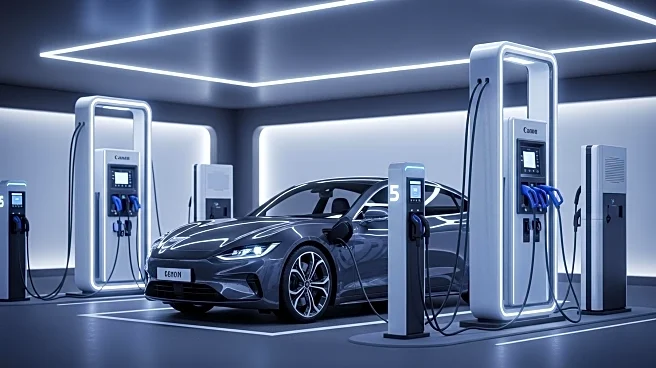What's Happening?
Chevrolet has introduced the new Bolt, which is set to be the most affordable electric vehicle in the United States, starting at $29,990 for the launch edition. The Bolt features significant upgrades, including a faster charging capability that nearly triples the previous model's fast-charging speed, reaching 150 kW. It is equipped with a 65-kWh lithium-iron-phosphate battery, allowing it to charge from 10 to 80 percent in just 26 minutes. The new Bolt offers a GM-estimated 255 miles of range and includes features such as an 11-inch digital instrument cluster, an 11.3-inch touchscreen, and optional Super Cruise.
Why It's Important?
The introduction of the new Chevrolet Bolt is crucial as it addresses the growing demand for affordable electric vehicles in the U.S. market. With its competitive pricing and enhanced charging capabilities, the Bolt is positioned to attract consumers looking for cost-effective and efficient EV options. This development is likely to influence the EV market by pushing other manufacturers to offer more affordable and technologically advanced vehicles. The Bolt's affordability and features may also encourage wider adoption of electric vehicles, contributing to the reduction of carbon emissions and supporting environmental sustainability goals.
What's Next?
Chevrolet plans to release the Bolt early next year, with additional trims following shortly after. As the Bolt enters the market, it will compete with other affordable EVs, potentially prompting price adjustments and technological advancements from competitors. The automotive industry will be closely monitoring consumer response to the Bolt's pricing and features, which could influence future EV development strategies. Additionally, Chevrolet's focus on affordability and fast charging may drive further innovation in battery technology and charging infrastructure.
Beyond the Headlines
The launch of the new Bolt highlights the ongoing shift towards more accessible electric vehicles, which could have broader implications for the automotive industry and environmental policy. As EVs become more affordable, there may be increased pressure on governments to expand charging infrastructure and provide incentives for EV adoption. This trend could also lead to discussions about the ethical and environmental impacts of battery production and disposal, prompting further research and development in sustainable battery technologies.









